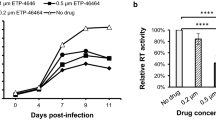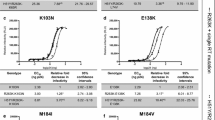Summary
Selected HIV drugs, either of the protease inhibitor type or the nucleoside antagonist type, have been shown to exert tumoricidal effects. Here, we show that the HIV reverse transcriptase inhibitor Truvada, a combination drug of the cytidine analogue emtricitabine and the adenosine analogue tenofovir, induces DNA damage and cell cycle arrest in human cancer cells. Phosphorylation of the DNA repair enzyme H2AX by emtricitabine/tenofovir indicated that it interfered with the integrity of the DNA and replication machinery in human cancer cells. Long term incubation of cancer cells with emtricitabine/tenofovir caused the formation of multi-nuclear giant cells, further indicating DNA replication problems. When tested as single agents, the anti-tumoral activity of emtricitabine/tenofovir was predominantly caused by tenofovir, although the combination with emtricitabine enhanced its effect on cancer cells. Combined with established anti-cancer drugs, emtricitabine/tenofovir was preferentially found to enhance the cytotoxic effect of doxorubicin, a promising drug for the treatment of relapsed, chemoresistant cancer. These results show that especially the adenosine analogue tenofovir could be used to interfere with the proliferation machinery of human cancer cells and to be applied for chemosensitization of cancer cells to already established DNA-interacting drugs.






Similar content being viewed by others
References
De Clercq E (2010) Antiretroviral drugs. Curr Opin Pharmacol 10:507–515
Chow WA, Jiang C, Guan M (2009) Anti-HIV drugs for cancer therapeutics: back to the future? Lancet Oncol 10:61–71
Humer J, Ferko B, Waltenberger A, Rapberger R, Pehamberger H, Muster T (2008) Azidothymidine inhibits melanoma cell growth in vitro and in vivo. Melanoma Res 18:314–321
Mattson DM, Ahmad IM, Dayal D, Parsons AD, Aykin-Burns N, Li L, Orcutt KP, Spitz DR, Dornfeld KJ, Simons AL (2009) Cisplatin combined with zidovudine enhances cytotoxicity and oxidative stress in human head and neck cancer cells via a thiol-dependent mechanism. Free Radic Biol Med 46:232–237
Kchour G, Tarhini M, Kooshyar MM, El Hajj H, Wattel E, Mahmoudi M, Hatoum H, Rahimi H, Maleki M, Rafatpanah H, Rezaee SA, Yazdi MT, Shirdel A, de Thé H, Hermine O, Farid R, Bazarbach A (2009) Phase 2 study of the efficacy and safety of the combination of arsenic trioxide interferon alpha and zidovudine in newly diagnosed chronic adult T-cell leukemia/lymphoma (ATL). Blood 113:6528–6532
Brüning A, Friese K, Burges A, Mylonas I (2010) Tamoxifen enhances the cytotoxic effects of nelfinavir in breast cancer cells. Breast Cancer Res 2010(12):R45
Perry CM (2009) Emtricitabine/tenofovir disoproxil fumarate: in combination with a protease inhibitor in HIV-1 infection. Drugs 69:843–857
Gingelmaier A, Grubert TA, Kost BP, Setzer B, Lebrecht D, Mylonas I, Mueller-Hoecker J, Jeschke U, Hiedl S, Friese K, Walker UA (2009) Mitochondrial toxicity in HIV type-1-exposed pregnancies in the era of highly active antiretroviral therapy. Antivir Ther 14:331–338
Martin LP, Schilder RJ (2009) Management of recurrent ovarian carcinoma: current status and future directions. Semin Oncol 36:112–125
Brüning A, Mylonas I (2010) New emerging drugs targeting the genomic integrity and replication machinery in ovarian cancer. Arch Gynecol Obstet 283:1087–1096
Strother R, Matei D (2009) Pegylated liposomal doxorubicin in ovarian cancer. Ther Clin Risk Manag 5:639–650
Rapoport BL, Vorobiof DA, Slabber C, Alberts AS, Hlophe HS, Mohammed C (2009) Phase II study of pegylated liposomal doxorubicin and carboplatin in patients with platinum-sensitive and partially platinum-sensitive metastatic ovarian cancer. Int J Gynecol Cancer 19:1137–1141
Sehouli J, Camara O, Schmidt M, Mahner S, Seipelt G, Otremba B, Schmalfeldt B, Tesch H, Lorenz-Schlüter C, Oskay-Ozcelik G, the North-Eastern German Society of Gynecological Oncology (2009) Pegylated liposomal doxorubicin (CAELYX) in patients with advanced ovarian cancer: results of a German multicenter observational study. Cancer Chemother Pharmacol 64:585–591
Livi L, Meattini I, Cardillo Cde L, Mangoni M, Greto D, Petrucci A, Rampini A, Bruni A, Galardi A, Cataliotti L, Biti G (2009) Non-pegylated liposomal doxorubicin in combination with cyclophosphamide or docetaxel as first-line therapy in metastatic breast cancer: a retrospective analysis. Tumori 95:422–426
Brüning A, Burger P, Vogel M, Rahmeh M, Friese K, Lenhard M, Burges A (2008) Bortezomib treatment of ovarian cancer cells mediates endoplasmic reticulum stress cell cycle arrest and apoptosis. Invest New Drugs. doi:101007/s10637-008-9206-4
Brüning A, Burger P, Vogel M, Rahmeh M, Gingelmaier A, Friese K, Lenhard M, Burges A (2009) Nelfinavir induces the unfolded protein response in ovarian cancer cells resulting in ER vacuolization cell cycle retardation and apoptosis. Cancer Biol Ther 8:226–232
Xiong X, Sui M, Fan W, Kraft AS (2007) Cell cycle dependent antagonistic interactions between paclitaxel and carboplatin in combination therapy. Cancer Biol Ther 6:1067–1073
Harper WJ, Elledge SJ (2007) The DNA damage response: ten years after. Mol Cell 28:739–745
Ashwell S, Zabludoff S (2008) DNA damage detection and repair pathways–recent advances with inhibitors of checkpoint kinases in cancer therapy. Clin Cancer Res 14:4032–4037
Acknowledgements
We gratefully appreciate the generous supply of emtricitabine and tenofovir by Gilead Sciences, Foster City, CA, USA.
Author information
Authors and Affiliations
Corresponding author
Rights and permissions
About this article
Cite this article
Brüning, A., Burger, P., Gingelmaier, A. et al. The HIV reverse transcriptase inhibitor tenofovir induces cell cycle arrest in human cancer cells. Invest New Drugs 30, 1389–1395 (2012). https://doi.org/10.1007/s10637-011-9704-7
Received:
Accepted:
Published:
Issue Date:
DOI: https://doi.org/10.1007/s10637-011-9704-7




